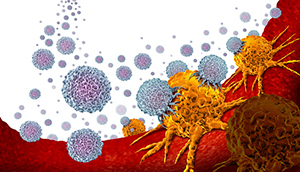A meta-analysis of published studies of immune checkpoint inhibition for advanced microsatellite instability–high (MSI-H) cancers—published as a brief report in JAMA Oncology by Petrelli et al—found high activity of these therapies across tumor types and evaluated agents.
Study Details
The analysis included 14 studies that included a total of 939 patients published as of December 2019, including 13 studies including previously treated patients. The studies included use of avelumab, durvalumab, nivolumab, and pembrolizumab as single agents; combination therapy with nivolumab and ipilimumab (two studies); and pembrolizumab plus chemotherapy (one study). Disease included a range of solid tumors, including colorectal, prostate, endometrial, gastric, and pancreatic cancers, as well as glioma.

Photo credit: Getty
Key Findings
The pooled overall response rate was 41.5% (95% confidence interval [CI] = 34.9%–48.4%). Rates ranged from a high of 61.2% in gastric cancer to lower rates of 47.1% in colorectal cancer, 36.1% in endometrial cancer, and 35.5% in other tumors. By study, rates ranged from 0% (in a study including patients with high-grade gliomas) to 64.7% (in patients receiving pembrolizumab plus chemotherapy for gastric/gastroesophageal cancer).
The pooled disease control rate was 62.8% (95% CI = 54.5%–70.3%), with a range of 33% (in a study including high-grade gliomas) to 81% (in patients receiving nivolumab/ipilimumab for colorectal cancer).
The pooled median progression-free survival was 4.3 months (95% CI = 3–6.8).
The pooled median overall survival was 24 months (95% CI = 20.1–28.5), with 1- and 2-year rates of 75.6% (95% CI = 61.8%–85.5%) and 56.5% (95% CI = 46%–66.4%).
The investigators concluded: “In this meta-analysis of patients with pretreated MSI-H cancer, immune checkpoint inhibitors were associated with high activity independent of tumor type and drug used. Among molecular biomarkers for selection of treatment, mismatch repair proteins may have a predictive value for the activity of immunotherapy.”
Fausto Petrelli, MD, of ASST Bergamo Ovest, Piazzale Ospedale 1, Treviglio, Italy, is the corresponding author for the JAMA Oncology article.
Disclosure: For full disclosures of the study authors, visit jamanetwork.com.

